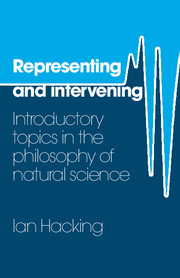Book contents
- Frontmatter
- Acknowledgements
- Contents
- Analytical table of contents
- Preface
- Introduction: Rationality
- Part A Representing
- Part B Intervening
- 9 Experiment
- 10 Observation
- 11 Microscopes
- 12 Speculation, calculation, models, approximations
- 13 The creation of phenomena
- 14 Measurement
- 15 Baconian topics
- 16 Experimentation and scientific realism
- Further reading
- Index
- Frontmatter
- Acknowledgements
- Contents
- Analytical table of contents
- Preface
- Introduction: Rationality
- Part A Representing
- Part B Intervening
- 9 Experiment
- 10 Observation
- 11 Microscopes
- 12 Speculation, calculation, models, approximations
- 13 The creation of phenomena
- 14 Measurement
- 15 Baconian topics
- 16 Experimentation and scientific realism
- Further reading
- Index
Summary
Philosophers of science constantly discuss theories and representation of reality, but say almost nothing about experiment, technology, or the use of knowledge to alter the world. This is odd, because ‘experimental method’ used to be just another name for scientific method. The popular, ignorant, image of the scientist was someone in a white coat in a laboratory. Of course science preceded laboratories. Aristotelians downplayed experiment and favoured deduction from first principles. But the scientific revolution of the seventeenth century changed all that forever. Experiment was officially declared to be the royal road to knowledge, and the schoolmen were scorned because they argued from books instead of observing the world around them. The philosopher of this revolutionary time was Francis Bacon (1561–1626). He taught that not only must we observe nature in the raw, but that we must also ‘twist the lion's tail’, that is, manipulate our world in order to learn its secrets.
The revolution in science brought with it new institutions. One of the first was the Royal Society of London, founded about 1660. It served as the model for other national academies in Paris, St Petersburg or Berlin. A new form of communication was invented: the scientific periodical. Yet the early pages of the Philosophical Transactions of the Royal Society have a curious air. Although this printed record of papers presented to the Society would always contain some mathematics and theorizing, it was also a chronicle of facts, observations, experiments, and deductions from experiments.
- Type
- Chapter
- Information
- Representing and InterveningIntroductory Topics in the Philosophy of Natural Science, pp. 149 - 166Publisher: Cambridge University PressPrint publication year: 1983
- 2
- Cited by



